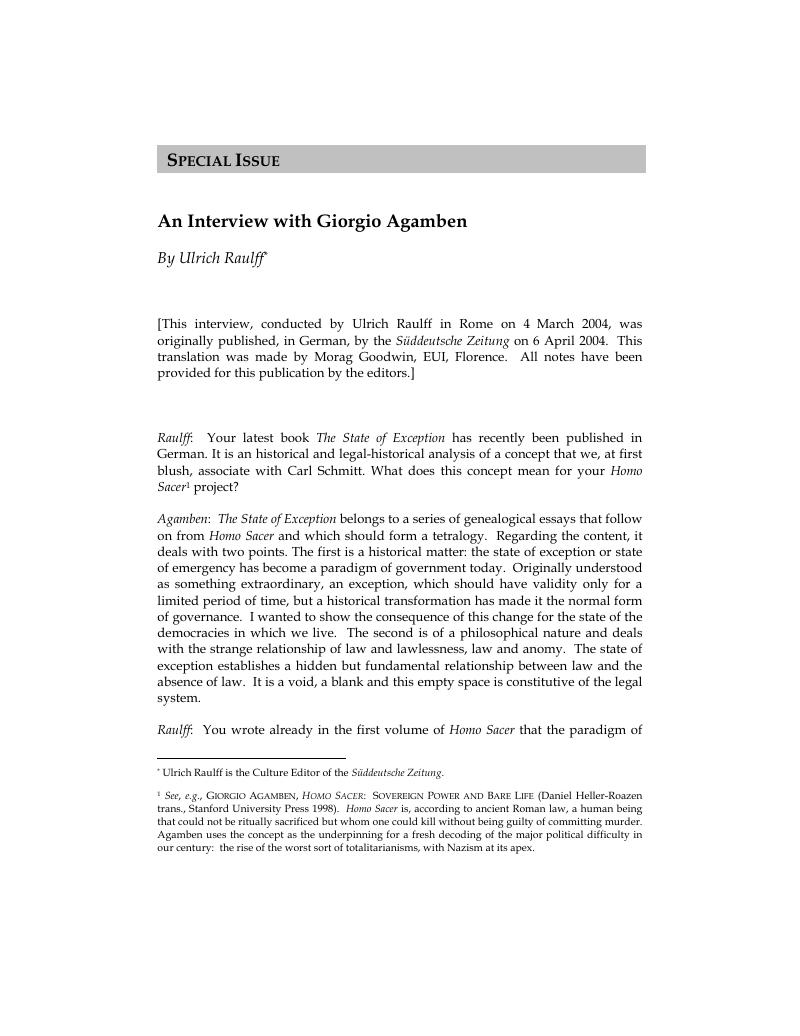Article contents
An Interview with Giorgio Agamben
Published online by Cambridge University Press: 06 March 2019
Abstract

- Type
- Other
- Information
- Copyright
- Copyright © 2004 by German Law Journal GbR
References
1 See, e.g., Giorgio Agamben, Homo Sacer: Sovereign Power and Bare Life (Daniel Heller-Roazen trans., Stanford University Press 1998). Homo Sacer is, according to ancient Roman law, a human being that could not be ritually sacrificed but whom one could kill without being guilty of committing murder. Agamben uses the concept as the underpinning for a fresh decoding of the major political difficulty in our century: the rise of the worst sort of totalitarianisms, with Nazism at its apex.Google Scholar
2 Giorgio Agamben, Remnants of Auschwitz: The Witness and the Archive (reprint, Zone Books 2002).Google Scholar
3 See, e.g., Michel Foucault, The Foucault Reader 217 (Pantheon 1984) (“[It was only] in the penitentiary institutions that Bentham's utopia could be fully expressed in a material form. In the 1830s, the panopticon became the architectural program of most prison projects. It was the most direct way of expressing ‘the intelligence of discipline …'”). The panopticon consisted of a large courtyard, with a tower in the center, surrounded by a series of buildings divided into levels.Google Scholar
4 Id. at 212. (“… And, although the universal juridicism of modern society seems to fix limits on the exercise of power, its universally widespread panopticism enables it to operate, on the underside of the law, a machinery that is both immense and minute, …”).Google Scholar
5 On 20 April 2004 the U.S. Supreme Court heard argument in cases seeking the determination of the legal status and judicial access of the Guantánamo detainees. See, e.g., Rasul v. Bush, No. 03-334 (D.C. Cir filed 2 Sept. 2003), cert. granted 124 S.Ct. 534 (2003).Google Scholar
6 The Nuremberg Laws, decreed at the 1934 Nazi “Party Conference on Freedom” included a law on citizenship, “which deprived all those ‘not of German blood’ of their rights as citizens.” Ingo Müller, Hitler's Justice 96-97 (Deborah Lucas Schneider trans., Harvard University Press 1991).Google Scholar
7 Karlsruhe is the seat of the Bundesverfassungsgericht (BVerfG – German Federal Constitutional Court) and the Bundesgerichtshof (BGH – German Federal Court of Justice). For a sense of the judicializing-political meaning of Karlsruhe, see Gerhard Casper, The “Karlsruhe Republic” – Keynote Address at the State Ceremony Celebrating the 50th Anniversary of the Federal Constitutional Court, 2 German Law Journal No. 18 (01 December 2001), at http://www.germanlawjournal.com/article.php?id=111.Google Scholar
8 See, e.g., Michel Foucault, Archeology of Knowledge (Pantheon 1982).Google Scholar
9 See, e.g., Pierre Hadot, What is Ancient Philosophy (Michael Chase trans., Belknap 2004); Philosophy as a Way of Life: Spiritual Exercises from Socrates to Foucault (Pierre Hadot and Arnold Davidson eds., Michael Chase trans., Blackwell 1995).Google Scholar
- 41
- Cited by


